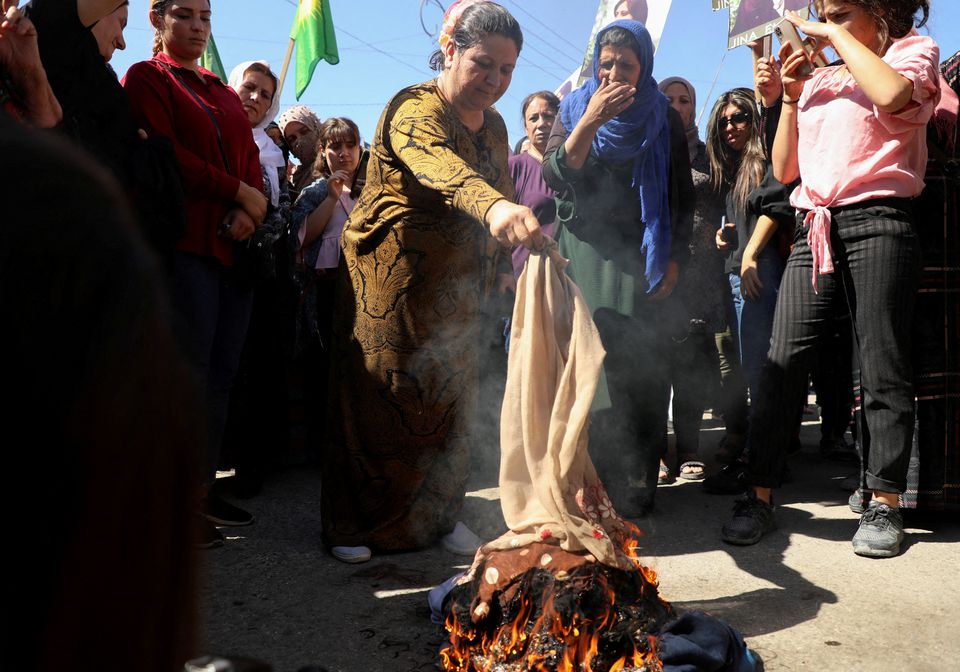Executive Summary
Protests sparked by the death of a young woman detained by the Morality Police in northwestern Iran continued this week, despite extensive efforts by the authorities to suppress the demonstrations. In an effort to shift attention from domestic grievances, the government accuses the West and foreign-based opposition groups of instigating the unrest, with state-linked outlets this week blaming a European embassy in Tehran of coordinating protests. Relatedly, the IRGC also resumed cross-border operations against Iranian-Kurdish opposition groups in northwestern Erbil province, killing a US citizen and prompting regional condemnation.
Protests in Iran continue despite internet restrictions
Demonstrations sparked by the death of Mahsa Amini, a 22-year-old woman who died in police custody after being detained by the Iranian Morality Police, continued this week, with gatherings now reported in most of Iran’s 31 provinces, and more than 80 cities in total. The Iranian government imposed significant internet and communications restrictions in response to the protests, banning access to social media and other communication services utilized to organize the demonstrations. Regardless, video footage and other reports of protests continue to emerge on a daily basis, with protesters seen chanting anti-government slogans and women, in some places, seen burning their hijabs and cutting their hair to protest the Islamic dress code.
Reports of violence and mass arrests also continue to emerge; however the casualty figures remain subject to conflicting reports amidst associated challenges. According to activist and opposition groups, at least 76 people have been killed in total, while government-linked media cite no more than a “dozen” have been killed. Opposition-linked sources also claim more than ten thousand have been arrested – a figure likewise subject to conflicting reporting. Amnesty International claimed 30 people have been killed in the clashes with security forces.
Government denounces rioters and accuses the west of interference
The government maintains that Amini died while suffering a stroke and denies the widely held belief that she was beaten to death by the Morality Police. President Ibrahim Raisi and other government officials continue to refer to her death as a “tragic event,” yet the rhetoric has increasingly shifted to denounce the protesters as “rioters” and emphasize that “chaos” will be not been accepted.
The government also organized two large-scale counterdemonstrations, as citizens were encouraged by mass text messages to participate in the gatherings to show support for the government. A large show of support organized after Friday prayers on 21 September was followed by another demonstration attended by thousands on 23 September, with both events extensively covered by state television.
More importantly, the government has increasingly attributed the unrest to “foreign instigators and agents”, including the US and other western countries. In repeated statements this week, Raisi accused the US of attempting to “exploit” the unrest to destabilize the country while similar sentiments were expressed by Foreign Ministry Spokesperson Nasser Kanani. On 25 September, the Iranian Foreign Ministry also summoned the ambassadors of Norway and the UK over what it referred to as “interference and hostile media coverage of the unrest.”
German Embassy accused of involvement in protests
On 29 September, the Tehran Times – an English-speaking newspaper with links to the Iranian Foreign Ministry – accused the German Embassy in Tehran of being directly involved in instigating the violence. The newspaper cites alleged evidence that four European countries and one Asian country have been “at the center of efforts to fan the flame of the protests”, and that the German Embassy has been a “coordinating center” for these activities by allegedly establishing contacts with protest organizers. Further details were understandably not provided but the report also mentions the involvement of Dutch officials in these efforts.
There are as yet no indications that the accusations will translate into acts of hostility affecting European – most notably German or Dutch – interests in the region. Similar accusations by Tehran are not unprecedented as domestic unrest is typically attributed to foreign interference in an assessed effort to downplay the extent of domestic grievances.
The accusation also follows a decision by the German Foreign Ministry to summon the Iranian Ambassador earlier this week to protest the actions of the Iranian security forces, and the report by Tehran Times may be a form of diplomatic retaliation. That said, the associated potential for hostilities affecting German and Dutch interests should not be discounted and related rhetoric is worth monitoring, especially if the accusations gain wider traction.
IRGC resumed cross-border strikes amidst protests
Wider regional repercussions of the protests are also worth monitoring and remain a standing consideration as long as the unrest continue. As discussed in a separate featured report, Iranian cross-border strikes escalated this week in Erbil province, with multiple casualties reported on 28 September as a result of UAV and missile strikes targeting Iranian-Kurdish opposition groups. The origins of the protests in Kurdish-dominated provinces in northwestern Iran, and related accusations by the government that KRG-based groups have fueled the unrest, and set conditions for a resumption in the operations which have been ongoing intermittently in recent years.
The US Department of State confirmed that a US citizen was killed in the strikes, but refrained from providing additional details citing “privacy concerns.” Iran-linked Sabereen News said the victim was a US “military trainer” of Iranian origin, however, this remains unconfirmed.
The killing of a US citizen understandably sets conditions for a further increase in US-Iranian tensions, however any US retaliatory activity is unlikely. The fatality is also set to galvanize the political backlash against the strikes amidst already strong condemnation from the governments of Iraq, KRG, Jordan, Saudi Arabia, and several other members of the Gulf Cooperation Council. Cautious optimism remains in effect that the political backlash will discourage further escalation, however, the outlook for further Iranian cross-border activity remains elevated as long as the protests in Iran continue.


